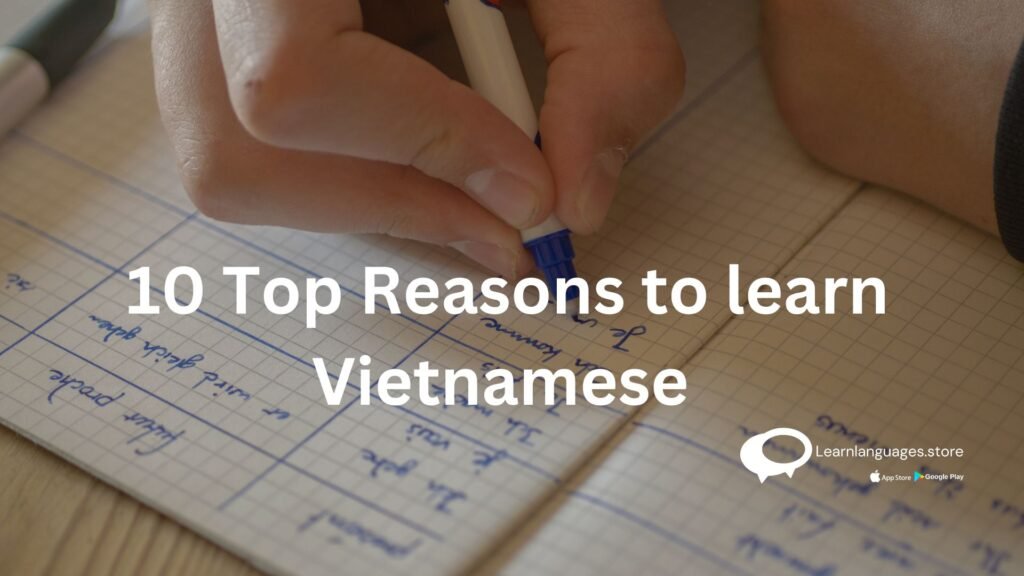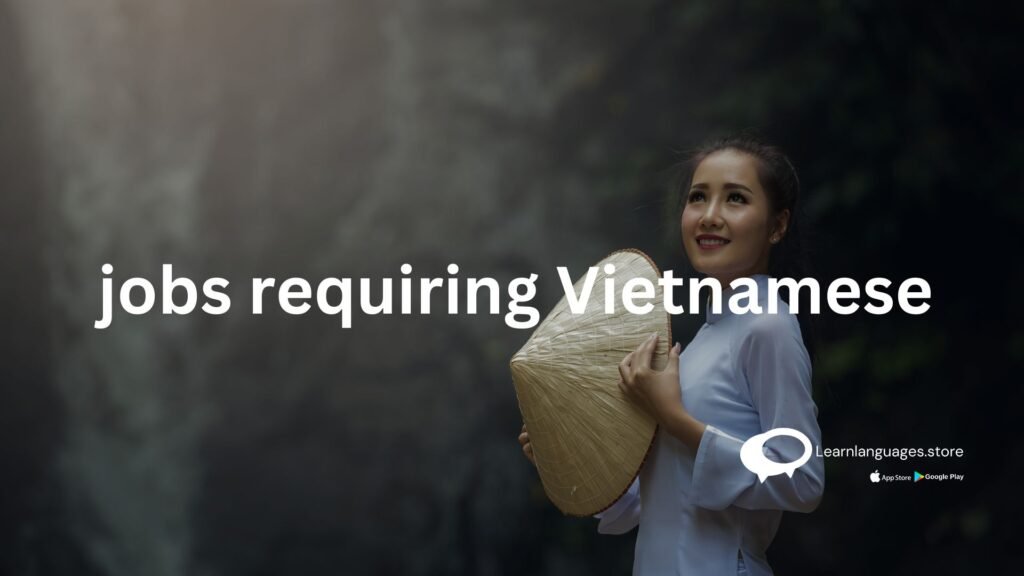Top 10 Reasons You Should Learn Vietnamese
Top 10 Reasons You Should Learn Vietnamese
Why learn Vietnamese, you may ask?
In terms of practical use, it may not seem a natural choice since it doesn’t give you access to a big geographic part of the world. Career prospects are also pretty limited.
Estimated reading time: 0 minutes
Despite this, there are many good reasons to learn Vietnamese. Here in this article, you will discover why it can be a superb choice and its benefits.
Vietnam is home to Halong Bay, caves, beaches, temples, and cities like Hanoi, Hoi An, Ho Chi Minh City, and many more famous places. It combines ancient history, diverse culture, and beautiful landscapes.
Learning Vietnamese as a new language can be a unique experience. It also has definitive positive effects, given that it has nothing but advantages.
First, let’s find out more about the overview of the Vietnamese language.
About the Vietnamese language
Vietnamese belongs to the Vietic branch of the Austroasiatic language family. It is also known as Mon-Khmer. Like Mandarin, Hindi, and Thai, it is a tonal language, i.e., the meaning differs by tone.
Vietnamese is the official language of Vietnam, Laos, and Cambodia. About 80 million people speak their native tongue. Plus, there are over 5 million immigrant populations worldwide.
Initially, it used the Chữ Nôm writing system that has Chinese characters (Chữ Hán) in combination with their own vocabulary.

This system was commonly used until Roman Catholic missionaries adopted a Latin-based alphabet.
Earlier, chữ Quốc ngữ (Quoc-Ngu) was the national writing. They adopted it in the 17th century and included diacritics to have six tones.
Vietnamese is the only official and national language spoken by around 87% population. Plus, there are many regional and minority languages like Mường, Tày, Khmer, Cham, H’Mông, and Nùng. This signifies the extensive linguistic diversity of the country.
There are 3 widespread mutually intelligible dialects of the Vietnamese language. This includes Northern (spoken around Hanoi), Central (Hue), and Southern (Ho Chi Minh City).
10 Top Reasons to learn Vietnamese
For various reasons, learning a language like Vietnamese is always an excellent decision.
It is complex, yet it’s fun and rewarding. It also gives a fresh perspective on thinking and philosophy by providing a new window to look into another universe.
This article talks about ten benefits one can derive from learning Vietnamese. So with no further ado, let’s explore more!

1. Vietnamese is easier than you think
The script of the Vietnamese language is written in the Romanized alphabet, meaning it’s a lot easier for English speakers to pick up. You wouldn’t have to worry about learning a brand-new script to learn Vietnamese.
Also, it doesn’t have gender-based differentiation and is gender-neutral in most instances. Plus, it does not use plurals or articles. All these make grammar very simple to study.
The simplicity does not stop here. The Vietnamese language also has very simple verbs, conjugations, and tenses. None of which will be challenging to pick up and pretty easy to learn.
For example, it has its hurdles with its 6 tones. Besides, the high number of vowel sounds, more pronouns, and usage of classifiers make it tricky.
Yet, apart from this and certain pronunciations, it is not challenging. It would be more like neither hard nor easy. But if you have an interest and purpose, you can pick up more quickly than you imagine.
As per FSI studies, Vietnamese falls in category 3, i.e., ‘hard languages.’ This implies that English speakers will take 2200 hours (1100 hours of classes and 1100 of self-study) to master the language and work in any Vietnamese setting.
2. It acts as a gateway to new cultures and languages
Language isn’t just about the alphabet, grammar rules, and vocabulary. It covers history, culture, and tradition.
Vietnam’s detailed history and culture are reflected in its language. This includes phrases, idioms, words, slang, and dialects. Thus, you need cultural immersion to comprehend the language’s history and evolution.
This would imply that the student would study and explore Vietnamese culture and customs. This results in a virtual parallel world, as with any new culture. Knowing culture and language improves your experiences by elevating and catalyzing one another.
Other than other Austroasiatic tongues, it is like SouthEast and East Asia languages.
It did historically use Mandarin characters and a tonal language. It may, if you wish, act as a stepping stone to learning other East Asia languages. This is because it is among the many of the easiest ones out there.
Vietnamese could be a great place to start off for those unfamiliar with the East Asian language and culture. This would become a novel, exciting, and otherworldly experience.
3. Exotic tourist attractions
If you ever visit Vietnam, you will find many interesting sights.
Some foreign language students may be concerned about whether they could enjoy themselves during that time. Vietnam is recognized for its strong tourist economy.
There are sights like none other on the globe in places like Saigon, Ho Chi Minh City, Hanoi, and Hue. And unique experiences found nowhere else on the planet.
Elephant rides are pretty unusual no matter where you go. Nothing entices your inner royalty like a forbidden mansion. From beautiful long coasts to stunning landscapes, there is something for every tourist.
Besides, Vietnam is one of the cheapest and most affordable places to travel in Southeast Asia. With a limited budget, you will have a relaxing and enjoyable time in this lovely nation.
And simply looking for things to do in Vietnam will bring up a list of attractions. For instance, islands, beach resorts, mountains, paddies, tunnels, lakes, and bridges.
Learning Vietnamese is worthwhile if you plan to travel to Vietnam or stay there for a while. This is because few Vietnamese people can speak English in Vietnam.
4. The fascinating culture of Vietnam
Vietnamese culture is just so captivating. It is a great, caring, and friendly community overflowing with compassion for others because of the tough years of war and hardships.
Because they were trained to care for one another and live in harmony with those around them. The people there are so lovely and modest.
They are taught to value and protect family relationships. Harmony, resilience, filial piety, patience, persistence, optimism, and modesty are their essential qualities. This is like Indian culture.
Despite the differences, they’ve also instilled a sense of hospitality and instinctive respect for a new culture. As a result, Vietnamese people are delighted to encounter English speakers studying their mother tongue.
5. The international spread of the language
Vietnamese people are everywhere. They had moved to various parts of the world in search of opportunities and settled in many countries.
You will find them in most big economies like the USA, China, Australia, France, Canada, South Korea, Taiwan, Germany, and Japan; the list is endless.
Studying Vietnamese can be like adding a feather to the hat in the global market. It enables communication with these locals who have become successful entrepreneurs and business players.
Interacting with their language would help score some brownie points and help with ease and clarity of communication. It can also be quite helpful in financial markets and help in easy trading.
Learning Vietnamese could be of great use in building networks. It is always a great conversation starter to open with a Vietnamese phrase or idiom suited to the context.
It also promotes the image that the learner is well accomplished and intelligent. This would boost networking and connectivity with people.
People subconsciously perceive someone speaking many languages as approachable and connected to humanity. Thus making them seem very approachable. It helps to feel connected and have extensive networks that significantly contribute to work and personal life.
It enables ease of communication and improves understanding, as each language has the features that make it better.
Speaking Vietnamese can make one communicate and connect better in networks. And thus feel included and part of the international community. It also helps in coming closer to new people, thus making it very beneficial to learn.
6. Vietnam’s rapidly expanding economy
The quantity of Foreign Direct Investment flowing in from investors globally, particularly from the Republic of Korea, Japan, and Singapore, has significantly contributed to Vietnam’s enormous economic growth.
Tourism, electronics, food processing, fashion, real estate, and manufacturing are major industries in Vietnam. This makes it a popular tourist and business destination in Southeast Asia.
The country’s collection of free trade agreements (FTAs) with different nations is another driving element behind Vietnam’s expanding investor appeal.
As a result, Vietnam is a popular destination for corporate investments and prospects. Learning the language will help you find a niche market within this rapidly expanding economy.
7. The fantastic food culture of Vietnam
Vietnam has one of the world’s most diversified, tasty, and healthful cuisines.
Each area, North, Central, and South, may be proud of something. During colonial times, the influence of Chinese and French culture added to the diverse gastronomic scenes.
It’s difficult to explain and compare the distinct characteristics of each region’s cuisines. This is because Vietnam has more than one food capital.
Hanoi provides some authentic and unique culinary experiences. Whereas Hue boasts of its royal heritage, Ho Chi Minh City takes pride in being the most diverse eating destination in the nation.
The delicious varieties of soup, noodles, rice, meat, rolls, coffee, and drinks will give plenty of tasty choices. But, you must find it yourself and select which one you like!
And what better way to know what you want to explore than to understand the language itself?
8. Careers and jobs requiring Vietnamese
Vietnamese is a recognized and the 20th most spoken language per Ethnologue. Still, it is not widely taught worldwide.
Knowledge of Vietnamese would set the learner out from the rest of the multilingual throng. This is because there would be fewer of them than those who spoke other famous taught languages worldwide.
This would mean that someone studying Vietnamese would be in high demand for language-related jobs. So, it increases career possibilities.
With the advent of globalization, Vietnamese-speaking individuals are resourceful globally. Hence, the English speaker who speaks Vietnamese is also highly in-demand in Vietnam.

There is a demand for English teachers (ESL) and interpreters. This is because the Vietnamese also wish to integrate into the global perspective. So, it opens up a world of chances since it is still an uncommon language.
According to this reasoning, translation is crucial in inter-language communications or media. In Vietnam, translators are in high demand in many sectors.
Working with organizations that deal with overseas clients or situations that require someone to interpret at meetings or translate papers for business purposes is the most obvious option.
Learning Vietnamese will aid in landing these land positions in high demand.
9. Despite the people, it is still a rare language
Vietnam is a homogenous country in terms of language and culture. Everything in Vietnam is written in Vietnamese, and everyone speaks that language.
Although there would be enough English for you to navigate, it is not common. Outside Vietnam, it is a less familiar language.
A significant Vietnamese population exists outside the country. Still, it is more likely that it has adapted to the local culture and language (not that it is at the expense of its own language and culture).
Learning Vietnamese thus will put you in one of the rarer communities in the world. It can also boost your charm when you can easily converse in Vietnamese.
You will face less competition for jobs involving language like this one. This is because the number of learners and speakers outside Vietnam is limited.
10. Personal growth
Learning a new language activates the brain in various ways and aids mental capacity development.
As per some research, bilingual or multilingual people are better at critical and analytical thinking. Thus, learning Vietnamese can help people become more innovative and more logical.
You will improve memory, cognitive thinking, and, most importantly, communication abilities. It can also make a positive impression on others, portraying the learner as intelligent and engaging.

Vietnamese may be highly different from your own language or English. Thus, grasping a parallel or opposite perspective is also an excellent method. This also makes the learner more sensitive to and accepting others’ opinions.
This would represent a turning point in one’s personal development and ideals. However, learning a new language takes time and dedication.
Vietnamese is no different. It is a time-consuming activity that demands commitment. Plus, it instills a feeling of discipline and gives you a sense of achievement.
It would be a constructive use of time, allowing students to make the most of their time. Being multilingual also helps a person’s capacity to multitask. It enables you to think in many languages and assists you in making better decisions.
As a positive effect of language learning, it would improve the learner’s native tongue. Also, it helps them better comprehend their culture and language.
Finally, it gives the student a sense of pride and accomplishment for having learned and possibly mastered a new language. Overall, knowing Vietnamese might enhance one’s personal development and worth.
Learn Languages Store
Vashi,
Email: services@learnlanguages.store










